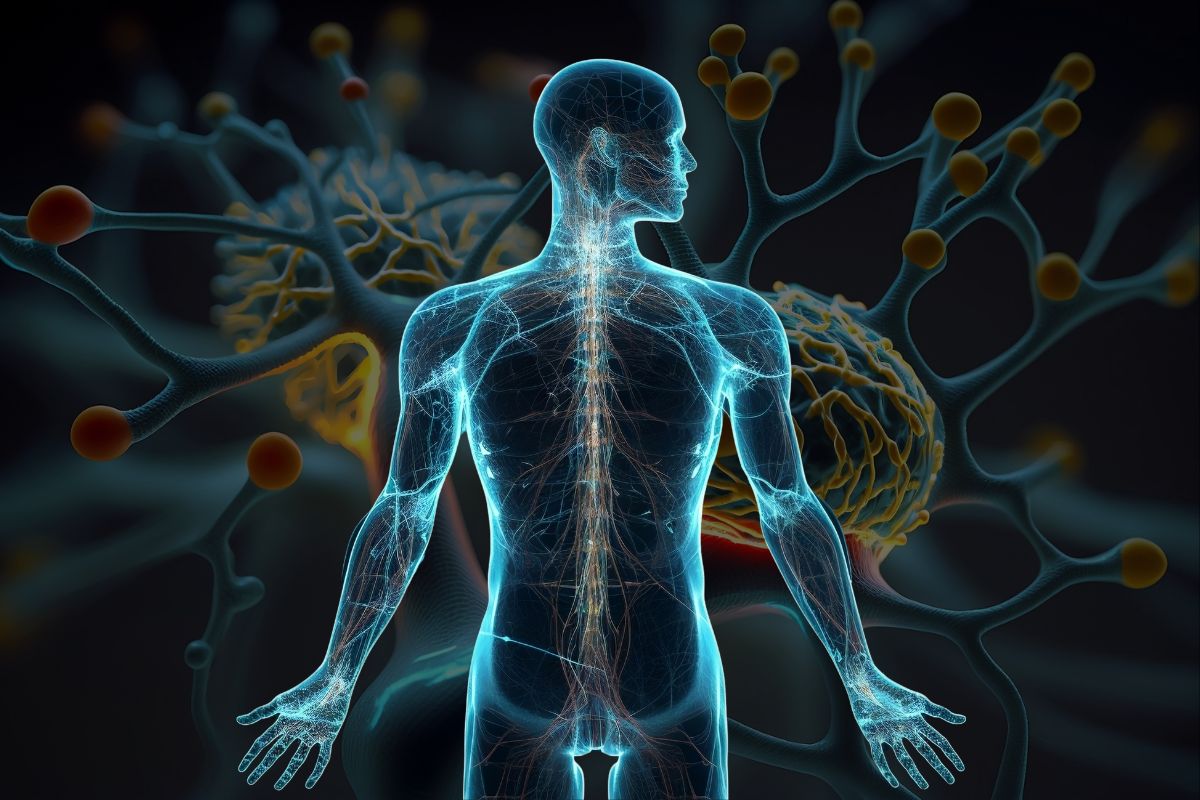Hello, if you’re reading this because someone you love has just been diagnosed with MND (motor neurone disease), or because you have symptoms and are worried that you might have it, I’m going to be straight with you about what causes motor neurone disease. We don’t actually know. Not fully. And that’s rubbish for whoever is involved.
Scientists have theories. Loads of them. Genetic markers, environmental triggers, all kinds of possible explanations. But there is no one clear cause that accounts for each case. Your doctor can’t point to one thing and say, “That’s why you’ve got MND.” It doesn’t work that way yet.
Motor neurone disease fiddles with the nerve cells in your brain and spinal cord. These are the motor neurones that are meant to tell your muscles what to do. What happens is when you’ve got MND, they slowly pack it in. Your muscles get weaker. They stop responding altogether after a while. Why does this happen? That is what researchers have been scrambling to sort out for decades.
Is Motor Neurone Disease Genetic?
Approximately 1 in every 10 people with MND has another family member who has also had it. So genetics are definitely at play, but it’s not the whole picture by a long shot.
You might have a parent or sibling with MND, yet never develop it yourself. Or you might be the only person in your known family to end up with it. The genetic connection is there but it’s just not that simple a calculation of who’s going to get it and who isn’t.
Some dodgy genes have been identified by scientists that are found in MND patients. SOD1, FUS, TARDBP. To most people these names probably mean nothing but researchers get all jazzed up about them.
Now, recent work from King’s College London and Stockholm University indicates that these flawed genes appear to interfere with the production of energy in motor neurones. They made neurones from stem cells with these gene alterations and observed what goes awry.
The SOD1 gene is particularly exciting because there’s a drug now, called tofersen, that actually addresses it. Patients with a defective SOD1 gene who received tofersen also experienced improved mobility and lung function after one year.
That’s massive because it’s one of the first treatments that goes after a specific genetic cause rather than just managing symptoms.
But even in families where MND travels down the generations, not everyone who has the faulty gene gets sick. Something else must trigger it.
They think that it is a combination of your genetic disposition and something in your environment, though they won’t be able to tell you exactly what those environmental factors are.
What Are Usually The First Signs Of Motor Neurone Disease?
This varies so widely from person to person that doctors frequently overlook it initially. It could be that your hands are starting to feel stiff or weak. You drop things more often. Can’t grip properly. Your writing gets messier.
Or in your legs and feet. Stairs become harder to climb. You trip over nothing. When you walk, your foot drags because you can no longer lift it properly.
Some people have twitches, spasms, or even painful muscle cramps that just keep happening. These fasciculations, as doctors refer to them, may appear anywhere in your body.
The problem is all these symptoms of motor neurone disease look like loads of other things. Twitching might be stress or too much coffee. Weak hands could be carpal tunnel syndrome. To trip over something could mean you’re clumsy or you need new glasses.
And this is the reason why people with MND commonly have to go sometimes more than once to their GP before there is ever any consideration of MND.
And then when it gets bad, you start having trouble breathing, swallowing, and speaking. You have too much saliva and find yourself drooling. Your mood changes. Your personality might shift. Eventually you become unable to walk or move without assistance.
Everyone experiences it differently. Some move through all these stages rapidly. Others much more slowly. There is no uniform pattern, which only makes it more difficult for families trying to prepare for what’s ahead.
How Fast Does Motor Neurone Disease Progress?
This is what everyone wants to know and the answer is proper frustrating. It depends. On what? Nobody’s entirely sure.
MND gets worse over months or years. Could be two years. Could be ten. The average is about three to five years from diagnosis, but averages don’t help much when you’re the one dealing with it or watching someone you love deal with it.
The type of MND affects how fast it moves. There are four main types. Amyotrophic lateral sclerosis is the most common. Progressive bulbar palsy mainly hits your face, throat and tongue muscles first. Progressive muscular atrophy starts in your hands. Primary lateral sclerosis goes for your legs.
Each type progresses at its own pace. Each person’s experience is completely unique. Some people stay relatively stable for ages. Others go downhill fast. Doctors can’t predict which way it’ll go for you specifically.
Why Nobody Can Answer What Causes Motor Neurone Disease Properly
Beyond genetics, scientists have got several theories floating around.
Something called dysregulation of microRNA keeps coming up in research papers. Basically, the way cells communicate goes wrong and they end up killing themselves off. Cellular excitotoxicity is the technical term. It doesn’t really matter what it’s called if we can’t stop it happening.
A 2025 breakthrough from Edinburgh University identified a molecule called lipoamide that might prevent liquid droplets from forming in motor neurones. These droplets seem to cause damage. If scientists can stop them from forming, they might slow or prevent MND. Might. Possibly. Maybe. That’s where we’re at.
Environmental factors get mentioned as well. Some studies reckon exposure to certain chemicals or heavy metals might increase your risk.
Military veterans have higher rates of MND but nobody knows why. Could be something they were exposed to during service. Could be genetic factors that also made them more likely to join up in the first place. Take your pick.
Age definitely matters. MND can hit at any age but usually affects people over 50. The older you get, the higher your risk becomes. That’s one of the few things we know for definite.
Motor Neurone Disease Treatments That Actually Exist
Right, here’s where things get slightly less depressing. There’s no cure yet but treatments are getting better.
Riluzole is a drug that can slow down ALS progression. It’s not going to fix anything but it buys you more time. Sometimes that’s all people want.
Tofersen, the drug for people with dodgy SOD1 genes, showed that patients had slower symptom progression after treatment. You need monthly lumbar punctures to get it, which sounds grim, but people do it because it works.
A drug called Ellorarxine is looking promising in recent trials. Still in testing but researchers are cautiously hopeful, which is as good as it gets.
Aside from drugs, treatment consists of physiotherapy to keep the muscles working for as long as possible. Dietary support because swallowing becomes difficult. Mobility aids including wheelchairs and walking frames. Communication aids when speech goes. Help with washing, dressing, everything.
An entire team of specialists takes over. Neurologist, physiotherapist, occupational therapist, speech and language therapist (SLT), dietitian, specialist nurse. They all work together to keep quality of life as decent as possible for as long as possible.
What About Prevention
Can you prevent MND? No. Not really. Since we aren’t quite sure what causes it, we can’t tell you how to prevent it. It’s the maddening cycle we’re all a part of.
Some evidence indicates that remaining physically active may lower risk just a little. Perhaps eating a lot of fruit and veg with antioxidants would help. But this is simply general health advice, not proven MND prevention strategies.
If MND runs in your family, you can get genetic screening. That tells you if you’re carrying risky genes. Doesn’t mean you’ll definitely get MND, but at least you know. Some people want that information. Others would rather not know.
The Reality Of Living With It
MND remains one of those conditions where medical science just hasn’t caught up yet. Families watch people they love decline bit by bit. Patients lose independence gradually. It’s horrible. There’s no sugar-coating it.
The Motor Neurone Disease Association has a helpline on 0808 802 6262 and online forums so you can speak to other people in the same situation. Sometimes that helps more than any medical treatment, because at least there is someone who actually gets it.
Research continues. New treatments pop up. Understanding improves. But for families living with MND today, progress feels frustratingly slow.
The truthful response to what causes motor neurone disease bears an asterisk: “We’re not entirely sure.” Scientists are working on it. Each study contributes another piece to the puzzle. Eventually, we’ll crack it. Just not fast enough for all of those who need those answers today.


Leave a Reply